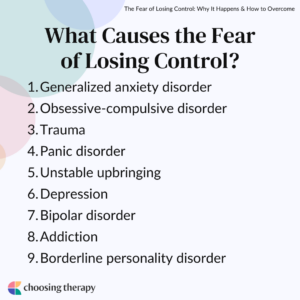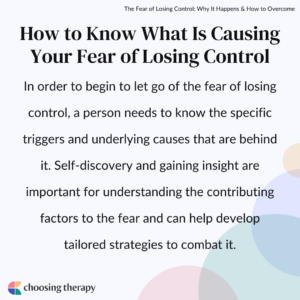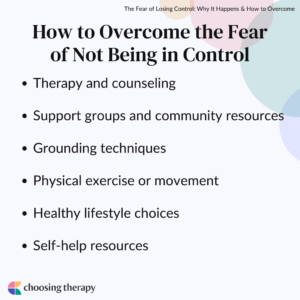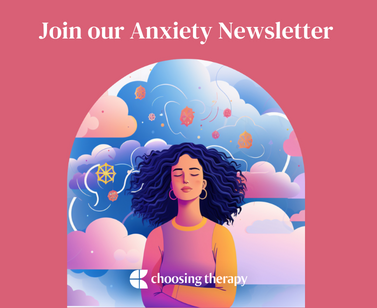The fear of losing control can happen for many different reasons. These can include past traumatic experiences, environmental factors, and conditions like anxiety or OCD. Certain thought patterns like black-and-white thinking and personality traits like perfectionism can contribute as well. Therapy, support groups, and mindfulness practices are all ways to overcome the fear of losing control.
Find a supportive therapist who can help with anxiety. BetterHelp has over 20,000 licensed therapists who provide convenient and affordable online therapy. BetterHelp starts at $65 per week. Take a Free Online Assessment and get matched with the right therapist for you.
What Is the Fear of Losing Control?
The fear of losing control can vary in intensity, ranging from a mild concern to debilitating fear. This fear can contribute to unhealthy behavior patterns, such as adhering to rigid rules and routines or avoidance of situations that can trigger this fear. These can all have a significant negative impact on a person’s life, work, and relationships.
What Causes the Fear of Losing Control?
A person who fears losing control is afraid that they will harm others or themself or cause bad things to happen because they are unable to control themselves. Many factors can contribute to the fear of losing control, including external events such as childhood trauma and instability or internal psychological processes like anxiety, addiction, or borderline personality disorder.1
Here are nine reasons a person may have the fear of losing control:
1. Generalized Anxiety Disorder
Generalized anxiety disorder is characterized by worry about a lot of different things, more days than not. A person with GAD lives their life in a state of worry and anxiety and often catastrophizes or imagines the worst-case scenario. This results in the person trying to control themselves as tightly as possible in order to prevent the worst from happening.
2. Obsessive-Compulsive Disorder
A person with obsessive-compulsive disorder (OCD) has unwanted, disturbing, and intrusive thoughts, and then they carry out compulsions or rituals to try to prevent their fears from happening. By carrying out the compulsion, the person reinforces the belief that if not for the compulsion, everything would be out of control.2
Common obsessions experienced by people with a fear of losing control include:
- Obsessions about failure
- Obsessions about insecurities and relationships
- Fear of going crazy, being overwhelmed, or “freaking out”
- Obsessive thoughts about causing harm to oneself or others
Common compulsions experienced by people with a fear of losing control include:
- Checking things repeatedly to make sure that they are safe
- Checking locks
- Repeatedly seeking reassurance from others
- Counting and recounting money or other objects
- Ordering or counting things
- Compulsively cleaning or straightening
- Hiding knives or other potential weapons
3. Trauma
The unpredictability experienced during traumatic events, as well as changes to a person’s nervous system, can lead to a fear of losing control. Trauma triggers can cause a fight or flight response, which results in extreme anxiety and distress. The distress and anxiety caused by trauma and PTSD are terrifying and can cause a person to fear losing control.3
4. Panic Disorder
People with panic disorder fear having another panic attack and often try to do things to prevent it, like avoiding potential triggers. The intense physical sensations that come with a panic attack can feel overwhelming, causing a person to fear losing control over their body.
In some cases, a person may experience depersonalization or derealization during a panic attack, furthering the sense of no control. A person with panic disorder may also fear losing control of their mind, as panic attacks can bring on thoughts of the worst-case scenario.
5. Unstable Upbringing
When a person is raised in an unstable upbringing, such as a childhood characterized by unpredictability or chaos, they may fear losing control because it reminds them of the powerlessness they felt in childhood. As a result, they may try to exert control over areas of their life whenever possible as a way to protect themselves against the unpredictability and chaos they experienced when they were young.
6. Depression
One of the symptoms of depression is having thoughts of uncertainty and dread. This can lead to increased pessimism and a bleak outlook about the future. A person with depression may fear that something terrible will happen to them or that they will lose control over their depression and be unable ever to come back from it.
7. Bipolar Disorder
Bipolar disorder can cause feelings of being out of control, as well as fears of losing control. Depressive episodes in bipolar disorder can bring on hopelessness and uncertainty about the future. In addition, manic episodes can lead to unpredictable behaviors, an increase in risk-taking, and possibly even getting into dangerous situations. This can lead a person with bipolar disorder to fear the next episode and the potential to lose control.4
8. Addiction
Addiction creates a cycle of losing control, fear of it happening again, and then turning to substances to cope. For instance, a person with a drinking problem drinks too much and does things they regret. The next time they go out drinking, they fear losing control, but because of their addiction, they drink more than they intended to. This creates a cycle of fear, powerlessness, and shame.
9. Borderline Personality Disorder
Borderline personality disorder (BDP) is characterized by extreme emotions and unstable relationships. A person with BPD may feel terrified of being rejected or abandoned, which feeds a feeling of helplessness and fear about losing control. A person with BPD may also doubt their ability to control their emotions and actions, as they can be unpredictable.
Options For Anxiety Treatment Talk Therapy – Get help from a licensed therapist. Betterhelp offers online therapy starting at $65 per week. Free Assessment Psychiatry for Anxiety – Looking for anxiety treatment that prioritizes you? Talkiatry can help. Find an in-network psychiatrist you can see online. Get started with our short assessment. Visit Talkiatry
How to Know What Is Causing Your Fear of Losing Control
In order to begin to let go of the fear of losing control, a person needs to know the specific triggers and underlying causes that are behind it. Self-discovery and gaining insight are important for understanding the contributing factors to the fear and can help develop tailored strategies to combat it.
Here are some strategies for how to learn what is causing your fear of losing control:
Learn to Identify Your Triggers
Notice interactions, places, and things that take place right before the fear of losing control kicks in. Are there certain people or situations that seem to make it worse? Are there certain scenarios, like driving, taking a test, etc., that can cause those fears to become stronger? Notice these triggers without judgment, and start to keep a log of when the fear comes up and what the triggers are.
Here is how to keep a log that can help you identify your triggers:
- Have a blank journal, anxiety and phobia workbook, or even an app on your phone available for tracking triggers.
- Notice what it feels like when the fear of losing control comes up for you. Take note of sensations in your body as well as thoughts.
- Write down the time, triggers, body sensations, and thoughts in your journal.
- Do this regularly until you start to notice themes and patterns.
Here are some questions to get a better sense of what is causing your fear of losing control:
- Who did I talk to that day?
- Where did I go?
- Were there any significant dressers before this happened?
- Am I having any problems at work, school, or in relationships?
- How did I sleep the night before?
- How am I feeling physically?
Ask a Person You Trust
Talking to friends, family, or colleagues and seeking their feedback can help you get an external perspective on your behavior. This can help you recognize patterns that you might miss on your own.
Here’s an example of how you can take feedback from others to help you overcome your fear of losing control.
- Identify a close friend or family member who you trust to talk to you about your fears.
- Let them know that you are working through your fear of losing control, and ask if they would be willing to help you.
- Let them know what you need. Do you want them to help you solve your problem or simply listen as you talk things through?
- As you keep your log of your fears and triggers, call this person and talk through what you notice that day. What patterns are starting to emerge? What are some positive things that you can do for yourself rather than staying in fear?
Go for a Professional Evaluation
Therapists and counselors can assist in uncovering causes of fear of losing control, such as trauma or mental health disorders. They will look at family history, symptoms, concerns, and support. This can help them come up with a proper diagnosis and treatment plan, which usually includes therapy and possibly medication. Don’t be afraid to seek help; this is a common fear, and there are treatments available.
How to Overcome the Fear of Not Being in Control
Overcoming the fear of losing control is possible with the right approach and support. Strategies may vary depending on a person’s personality, lifestyle, history, and the underlying causes of the fear.
Here are some tips for how to overcome the fear of losing control:
Begin Therapy
Many different therapy options are effective for dealing with a fear of losing control. If the underlying issue is trauma, eye movement desensitization and reprocessing (EMDR) can help people reprocess past trauma and remove the triggers that come up in daily life. If the triggers are more thought-based, cognitive behavioral therapy (CBT) can help change the negative thoughts and take the focus off of the worst-case scenario.
Another therapy option is acceptance and commitment therapy (ACT). ACT focuses on accepting the fear of losing control and at the same time choosing actions based on values instead of the fear.7 Dialectical behavior therapy (DBT) is a type of therapy that focuses on building coping skills and tools to help a person better tolerate distress. This can be helpful for a person who fears that they will lose control because they can’t tolerate emotions, and it is especially helpful for borderline personality disorder.5
Join a Support Groups
A 12-step group, DBT group, or another mental health group can help provide support and strategies for managing the fear of losing control. One thing that many people find helpful in groups is being able to share experiences and learn from others who have been there and understand specific challenges and coping skills.
Try Grounding Techniques
Grounding techniques can be an effective tool to get back into the present moment and not focus so much on fears. One example is to feel your feet on the ground. Notice the contact between the ground and your feet, and breathe. Look around and notice what you see. Focusing on your surroundings and the sensations in your body can be helpful for regulating mood.
Incorporate Daily Physical Exercise or Movement
Moving your body and getting some exercise is a proven way to reduce anxiety. Try taking a walk, dancing to some music, or even just standing up and stretching. Exercise releases endorphins, which can help improve mood and sense of well-being. Combine some movement with music or time with a friend, and it can be even more helpful.6
Focus on Healthy Lifestyle Choices
Take good care of your body, practice a healthy nighttime routine, and prioritize getting a good night’s sleep. Eating a healthy, nutritious diet and reducing substances like caffeine and alcohol, which can contribute to anxiety and fear of losing control, are helpful, too. Taking care of yourself can help regulate your nervous system and lessen the fear of losing control.
Explore Self-Help Resources
There are countless self-help resources available for coping with the fear of losing control, including books, videos, and workbooks. There are books available with coping skills for anxiety, panic, and healing from an unstable childhood. You might want to check out specific workbooks with tools for reducing anxiety and fear that can help you increase your coping skills.
When to Seek Professional Support
When fears impact your ability to sleep, work, do well in school, or have healthy relationships, it’s a good idea to seek professional help for an evaluation. Fear of losing control can be tied to several serious mental health conditions. An online therapist directory or online therapy platform can help you find a therapist who is skilled in treating these fears.
In My Experience
To help our readers take the next step in their mental health journey, Choosing Therapy has partnered with leaders in mental health and wellness. Choosing Therapy is compensated for marketing by the companies included below. Talk Therapy Online-Therapy.com – Get support and guidance from a licensed therapist. Online-Therapy.com provides 45 minutes weekly video sessions and unlimited text messaging with your therapist for only $64/week. Get Started Virtual Psychiatry Hims / Hers If you’re living with anxiety or depression, finding the right medication match may make all the difference. Connect with a licensed healthcare provider in just 12 – 48 hours. Explore FDA-approved treatment options and get free shipping, if prescribed. No insurance required. Get Started Anxiety Newsletter A free newsletter from Choosing Therapy for those impacted by anxiety. Get helpful tips and the latest information. Sign Up Learn Mindfulness, Meditation, & Relaxation Techniques Mindfulness.com – Change your life by practicing mindfulness. In a few minutes a day, you can start developing mindfulness and meditation skills. Free Trial Choosing Therapy Directory You can search for therapists by specialty, experience, insurance, or price, and location. Find a therapist today.Additional Resources
Online Anxiety Test A few questions from Talkiatry can help you understand your symptoms and give you a recommendation for what to do next. How Does ERP Help With Intrusive Thoughts? Obsessive compulsive disorder (OCD) is a psychiatric condition marked by the presence of obsessive thoughts, images, doubts, or urges, followed by compulsive behaviors or acts aimed at easing the distress caused by the obsession. While the content of the obsessions can take many forms, they are always repetitive, persistent, involuntary, and intrusive, and they often result in a great deal of anxiety for the person experiencing them.










